and the printer lives on (at least so far...)
but all thoughts have to go to Lori... who doesn't get to go to bed yet... :-(
D-day, of course, means Dissertation day (and hopefully not disaster day). This morning (later this morning...) we will take our freshly printed dissertations to be bound and disposed of in the English department...
 But the far more important aspect of D-Day is that it is also Dona's birthday (see how I themed that?... Pretty good for so late...).
But the far more important aspect of D-Day is that it is also Dona's birthday (see how I themed that?... Pretty good for so late...).So HAPPY BIRTHDAY to Dona, who has already had her dissertation bound (grrr).
Unfortunately the picture is not of a cake we so kindly made for Dona, but something I pilfered offline because I thought it really should have been a cake we made for Dona. Since today is also Carrot Day... the big carrot at the end of the D-writing process.
I may have used up all my intellect on the D-thingy... I feel like my brain is sliding through the printer along with the paper and ink.
I should have known something had to go wrong.
I was on track as far as proofreading and bibliography-collating goes, getting closer to the printing stage with every moment. I had even finally figured out which paper to use (thanks to Dona), after days of deliberation (erm... procrastination?).
And yet here I am, with my dissertation still on my computer but not yet on my bookshelf.
*Sigh*
Stupid printer.
The thing had been printing in a kind of reddish tint on draft ever since I changed the black cartridge earlier this week, but I figured that would change when I set it on proper quality. Silly me. I changed the colour cartridge because it was out, and then started printing. Everything came out pink. Even the black text had pink rims.
So lots of calling Dad in desperation and running to Staples to spend a fortune on more cartridges (luckily it stopped there and I didn’t end up buying a new printer... although to be honest that would have been cheaper than buying two ink cartridges – no logic there) we are up and running again. Alas, not within print shop hours.
With all the dashing to and from Staples and printing out mounds of test pages, I still have to finish my abstract. Oddly enough it’s proving the hardest bit, I suppose because it’s the very last thing and is meant to epitomise the entire argument.
What was I arguing again?
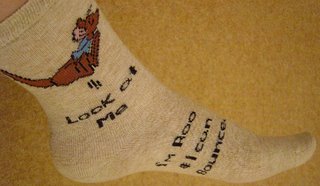 On a much happier note, Dona started her own blog today. Yay!
On a much happier note, Dona started her own blog today. Yay!So, despite the fact that I haven’t actually or officially finished the dissertation yet, I am going to celebrate by putting on my socks (because socks are good), and getting a little bit prematurely bouncy.
I remembered how much I miss storms: the kind with ripping, cracking, house-shaking thunder. I wanted to crawl into bed and drink steaming tea and listen to the swishing patterns of the rain.
 Where I wish I was right now...
Where I wish I was right now...What is it about academic writing that makes me long to be somewhere magical?
What I would give right now to be at Disney World.... To be riding the monorail on the way to Epcot for dinner, or to MGM just to stroll around listening to the Indiana Jones music played from the bushes, or to the Magic Kingdom for a funnel cake and Wishes and riding Splash Mountain (ah, the laughing place) until the park closes...
Graduation present, anyone...?!
[Image: Kevin A. Boudreaux]
That is my grand sweeping statement for the day. That, and I believe the editors at The Times are beginning to read my mind.
This is, obviously, quite concerning. On the face of it, I have never been known to exactly agree with the majority of editorial comments I have read over the past few years. Partly, my annoyance at editorials tends to stem from what I see as a tendency towards media skepticism – the nay-saying anti-establishment voice (couched in terms of “political correctness”) that heralds any opportunity to criticise the establishment. Perhaps that is why I was so surprised at the argument of the main Times editorial, A Thwarted Plot, which was basically that we should be grateful to the intelligence and security services instead of heaping criticism on them.
But it was Gerard Baker’s column, The first step towards defeating the terrorists: stop blaming ourselves, that really had me nodding along.
“There’s a familiar ritual each time an operation to thwart a putative terrorist incident dominates the news. After the public’s initial expressions of relief and shuddering contemplation of what might have been, a rising chorus of sceptics takes over, with a string of questions and hypotheses…”
Baker goes on to talk about the “terror plots,” such as this summer’s plan to blow up buildings in Chicago, that were revealed to be flimsy at best, and which resulted in ridicule of the “overzealous authorities.”
“You can guarantee that every incident now, whatever the evidence, will be treated with such derisive doubt. If the police had got to the 9/11 hijackers or the 7/7 bombers in time, a sizeable chunk of respectable opinion would have dismissed them as idealistic young men with no real capacity or intent to cause harm.”
But the truth is that this skepticism—this tendency we seem to have to dismiss what doesn’t happen and point fingers when it does—is at heart political:
“How convenient, click the doubters, with rolled eyes and theatrical sarcasm, just as the Government’s got some new bonfire of civil liberties planned; or just as President Bush’s poll numbers are collapsing; or just as Israel is stepping up its ground attacks in southern Lebanon”
He rightly points out that this is “a neatly comprehensive schema of cynicism” that takes into account every eventual outcome: if a terror plot is foiled, then it wasn’t really a terror plot to start with. If a terror plot goes ahead, then, of course, we are the ones to blame – intelligence wasn’t good enough; security wasn’t tight enough; the government didn’t act fast enough.
It reminds me of the intense political backlash after Hurricane Katrina. Yes, there were horrendous flaws in the government’s response. But people wanted someone to point fingers at. The picture that began to form was of a government out to kill its people—only the poor black ones, of course.
But this is more fundamental. The threat we face isn’t natural and democratic; it is hateful and destructive, suicidal and wilfully murderous.
“the consistent theme is denial – denial of the reality of the mortal threat we face, denial of the reasons we face it. The villain for these people is not the jihadist, with his agenda of destroying our very way of life. It is, as it has always been, that malign continuum of institutions of our very own authority that begins with the aggressive police officer and goes all the way up via the credulous media and craven officials to No 10 and the White House.”
Baker points out that 9/11 wasn’t an Islamic response to American action. In fact, he says, it occurred at a time when the US was making a real effort in the Middle East. While we have unfortunately provided bait in our responses since 2001, these people need no more reason than our very existence and the freedoms we (should) cherish to hate us.
Baker’s argument boils down to our personal responsibility, as individuals and as a nation and as a world, to understand that we do face a new kind of enemy and to be committed to eradicating that enemy. Old-world diplomacy won’t work against extremism; we are in a modern global era that is still finding its footing when it comes to dealing with these threats. We need to unite not around an apologetic isolationism, but around a pride in what we are so lucky to have.
“Events such as yesterday’s near-miss should remind us that September 11, 2001, gave birth to a radical and dangerous new world. It required the US – an imperfect country to be sure, but the only one with the power and the will to defend the basic freedoms we too easily take for granted – with its allies to remake the international system.”
One thing that continually strikes me is this: we have forgotten what freedom and liberty and all those grand ideas that support our countries really mean to us. We take for granted the freedoms we live with every day, that protect and support us. We roll our eyes when President Bush yet again harps on with that characteristically languid drawl about the right of all people to freedom and the commitment of the United States to promoting that freedom. The founders of the United States would be rolling in their graves to hear the blasé attitude so many of us assume when it comes to the rights they fought for.
Like Baker, I’m not saying that it is wrong to criticise what he refers to as the ‘blunders’ in Iraq; I’m certainly not arguing that we should refrain from highlighting wrongful actions when they occur at our own countries’ hands. However:
“we should not, in our frustration, confuse the real enemies here. We should not mistake the unlooked for dangers caused by blunders and arrogance in Washington for the targeted threats posed by nihilism and hatred in much of the Middle East and in some of our own cities.”
Political correctness has gone to the other extreme, so much so that we blame our own countries—our institutions and governments—before turning to the obvious source of the problem.
So to Gerard Baker I say: Finally someone actually addresses the rather pathetically apologetic nature of such narrow-minded scepticism that characterises much of our public opinion. It's about time we credited 'freedom', 'liberty' and 'democracy' not just as catchphrases of President Bush or rhetoric of a Western campaign, but as real principles that we have a responsibility to stand up for and to protect, Republican or Democrat, liberal or conservative, British or American.
And to the rest of you I say: I now step down from my soapbox (with my sincerest apologies if you have made it this far).
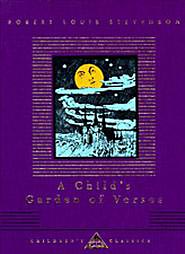 As an antidote to a completely dulled mind, I’ve been web-crawling again, and I discovered Brian’s Amazon blog. In one post, entitled 'the balm of books', he talks about how books can act as spiritual restoratives on those days we are feeling out of sorts.
As an antidote to a completely dulled mind, I’ve been web-crawling again, and I discovered Brian’s Amazon blog. In one post, entitled 'the balm of books', he talks about how books can act as spiritual restoratives on those days we are feeling out of sorts.Today is one of those days.
Among the books Brian lovingly remembers is R. L. Stevenson’s A Child’s Garden of Verses. I cannot express how much I wish that book was here instead of sitting in my old room at my parents’ house. I can picture it now – the purple cloth cover with gold lettering that is missing a slipcover – lost, no doubt, one night at sea…
One night before bed I asked Mum for some craft supplies and rigged up a miniature mast complete with a paper sail. I lined up all my toy animals, with Wilbur the pig at the helm, at the foot of my bed, and stole a chocolate bar or two and a carton of drink from the kitchen. At night I would float across the poem's ocean, chasing all the other adventures from Stevenson’s imagination.My bed is like a little boat;
Nurse helps me in when I embark;
She girds me in my sailor’s coat
And starts me in the dark.
At night, I go on board and say
Good night to all my friends on shore;
I shut my eyes and sail away
And see and hear no more.
And sometimes things to bed I take,
As prudent sailors have to do;
Perhaps a slice of wedding-cake,
Perhaps a toy or two.
All night across the dark we steer;
But when the day returns at last,
Safe in my room, beside the pier,
I find my vessel fast.
Sometimes at night when I am having trouble sleeping I close my eyes and try to relive those nights I would kiss my parents good night and truly believe I was setting out on a grand adventure in my bed.
It never works as well as it did back then.
But how could I think of not bringing that wonderful little book here with me?
 There was a time I wanted to be a writer. I loved the feel of words, the possibilities of ink and paper or the tap-tapping of fingertips. Ideas would float around my head – “Wouldn’t it be great if there was a book on ___?” “I should write a book about___”.
There was a time I wanted to be a writer. I loved the feel of words, the possibilities of ink and paper or the tap-tapping of fingertips. Ideas would float around my head – “Wouldn’t it be great if there was a book on ___?” “I should write a book about___”.I used to love the process of stringing together sentences and watching something coherent appear before my eyes. There was a thrill in it – a nodding pleasure as I rushed to finish one sentence and begin the next – all the while thinking “I know where this is going next”. It wouldn’t take me long. It was fun, exhilarating even.
But it has honestly taken me an entire day to write one page. I may be seriously starting to reconsider my calling in life.
 I have developed a new addiction.
I have developed a new addiction. Maple Pecan Danish.
Oh my.
The smell is incredible. I went to Sainsbury's today and bought two boxes of two, just because I couldn't leave them there... I just couldn't do it. These things are heavenly. There's the flakey pastry, the crunch of pecan and, best of all, the gooey mapley bit inside. One of these and an Earl Grey and I'm perfectly content.
The only problem is there are two more sitting in a box in the kitchen... just waiting...
So I donned my lab-coat and explored Google Page Creator, a Web-site design tool that allows you to create pages directly into a browser window, with automatic saving, a variety of design options, and an extremely easy publishing tool. It's really a Web-tool for beginners rather than experts, so I'm sure there are people out there who think it's a bit basic, but since I fall much closer to beginner than expert (!), I had fun experimenting.
Here's what I came up with:
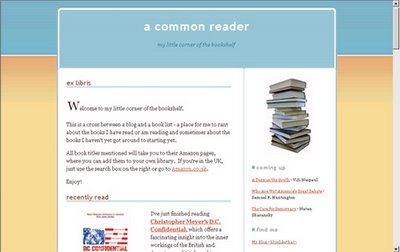
It took me a while to figure out what to do with a new random Web page... But then I got a bit carried away.
I was going to call it 'a(n un)common reader', but while that would be a great name for an avid reader in a convent, I was afraid the religious-order connotations were too strong :-)
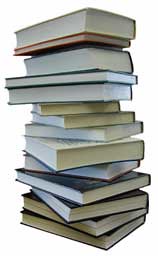 There is much talk of book lists in the air, so it seems. Lori is busy compiling her ‘must read’ list for post-dissertation mind-expansion, and Brian Sibley has compiled his top ten tomes (causing a few rejects to turn a cold spine in disgust at not making the cut). So I’ve deliberated, and here are mine.
There is much talk of book lists in the air, so it seems. Lori is busy compiling her ‘must read’ list for post-dissertation mind-expansion, and Brian Sibley has compiled his top ten tomes (causing a few rejects to turn a cold spine in disgust at not making the cut). So I’ve deliberated, and here are mine.Unfortunately I just couldn’t find a way to narrow it down to ten, and twenty seemed too many, so I compromised at fifteen. These are also not all novels, which seems to be the case for others’ lists.
A disclaimer: This list is a mixture of books I would classify as my favourites (worth re-reading again and again) and those that have influenced my life more as ‘experiential reads’. Most make it into the second category, either because they are books that ‘make you think’, or they hold very special memories of their first reading.
And to defend against accusations that the Bible didn’t make it into my ‘influential books’ list, putting the Bible in with Charlotte’s Web just doesn’t seem to make much sense. It’s something altogether different. (Plus, I tend to think that people who answer ‘The Bible’ to the question ‘What is your favourite book?’ are either completely unimaginative or trying to sound virtuous.)
Since we seem to favour alphabetical order around here, we’ll start with a suicidal crazy woman.
The Awakening - Kate Chopin
Read for the first time in college. It wouldn’t necessarily make it onto my ‘favourite books’ list, but it was one of those reads that reinforces everything I love about analyzing literature.
Charlotte’s Web – E. B. White
One of the first books I can remember treasuring. My Dad would read this--along with a large stack of Enid Blyton books--to me at night. I wanted my very own Wilbur. Any child who watches the movie instead of reading this wonderful book misses out on a world of imagination.
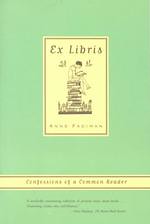 Ex Libris – Anne Fadiman
Ex Libris – Anne FadimanThis collection of essays vies for the number one spot on my ‘all-time favourites’ list. If you love to read and have a passion for books, you have to read this incredible book. Anne Fadiman is the daughter of Clifton Fadiman, the writer, editor, and popular radio-show presenter. These essays originally appeared in the Common Reader column of Civilization.
The Imagineering Way – Disney Imagineers
This one is both a favourite and an experiential read. Lori and I began it in a hotel room at Disney World last summer at a time of big decisions. Figment and the ‘blue sky session’ are a true inspiration.
Jane Eyre – Charlotte Brontë
An absolute classic. What more can I say? I’ve loved this book ever since I first read it at school.
The Lion, The Witch and the Wardrobe – C.S. Lewis
One of the most incredible stories of all time (as are all the Narnia books). This was perhaps my earliest book. It’s truly beautiful. I also learnt more about Christianity from Aslan than I ever did from Anglican church services.
Nine Horses – Billy Collins
Nine Horses is just one example of this incredible poet’s work. U.S. poet laureate from 2001-2003, Collins has a style that is all his own and a skill for making the most mundane thought into a little world (see example on right-hand sidebar).
 Paris – Julien Green
Paris – Julien GreenThis is a little gem of a book by a man who creates a virtual Paris inside his mind and, in turn, presents it between the grey covers of this little volume. I particularly love the bilingual presentation: French on the left, English on the right. An all-time favourite and one of the most lyrically beautiful uses of language in prose I have ever read.
Persuasion – Jane Austen
I have a hard time selecting an Austen novel for this list, since they are all so wonderful. Pride and Prejudice should probably have pride of place here, since it was the first one I read, but Persuasion is my favourite. No one can beat Austen’s sparkling wit, and I would argue that we have her to thank for the modern novel.
Possession – A. S. Byatt
One of the most incredible novels I have ever read. Watching a movie adaptation before reading the book can be a little off-putting (no effort required for a film, whereas a book is a two-way process). This one, however, defied all expectations. For an academic there is no better book, especially a literary academic (especially especially a nineteenth-century literary academic). This is also an ‘experiential read’, bringing back memories of sitting on a balcony overlooking the beach in Seaside, Florida, last summer, watching pre-4th July fireworks in the distance.
 A Tree Grows in Brooklyn – Betty Smith
A Tree Grows in Brooklyn – Betty SmithWhen I think of this book I am sitting under a tree on an expansive green lawn in my school uniform. I am 16 and I am in the middle of my GCSE exams, on study leave, and desperate to escape from the world of revision. I sat under that tree, with the imposing old building that had been my school for 11 years staring down at me from the other end of the lawn, and found a completely different world in the pages of this incredible novel.
To America – Stephen Ambrose
Literally a love song to America, written by a historian whose experiences alone make the book worth reading. This is part history, part memoir, part exploration of a country and what it stands for… a wonderful book.
To Kill a Mockingbird – Harper Lee
Another classic. Everyone should read this novel.
Vindication of the Rights of Women – Mary Wollstonecraft
Reading this book isn’t just about agreeing with Wollstonecraft; it’s about being incredulous that anyone could disagree with her. A true insight into another world and the founding text of the feminist revolution. It’s not light reading, but it is important.
W
 ithout Reservations – Alice Steinbach
ithout Reservations – Alice SteinbachOkay, this one is perhaps the odd one out in that it is hardly a literary masterpiece. But it influenced my life in a strangely profound way. The travel narrative of a Pulitzer Prize-winning journalist from Baltimore who decides to shake up her life and travel around Europe (France, England, Italy), this was one of the first ‘travel books’ I read, and one of those books that makes you think ‘I know what kind of life I want to live’. Perhaps I’ve turned into a middle-aged woman too young, but on the other hand I like to think that I’ll live out my mid-life crisis early, so I don’t have so many regrets when I get there.
There are so many that I culled from the list… Daphne du Maurier’s Rebecca, Elizabeth Gaskell’s North and South, Vickram Seth's An Equal Music, Hemingway’s A Moveable Feast, Fitzgerald’s Tender is the Night (which will never fail to remind me of three months in France), Alain de Botton’s The Art of Travel, Wilkie Collins’s The Woman in White, Michelle Magorian’s A Little Love Song (read in a single sitting at 13), Sarah Trumball’s Almost French, Audrey Niffenegger’s The Time Traveler’s Wife (read over the Atlantic ocean)… and so many more. I suppose those are my ‘honorable mentions’.
I wonder what will happen to my list in 20 years time. How many will still be there? Even more exciting: what will be the new additions?
Speaking of books:
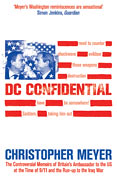 Finished last week: Christopher Meyer’s D.C. Confidential – great read.
Finished last week: Christopher Meyer’s D.C. Confidential – great read.Purchased (for Lori) last week: See her post.
Purchased today (well… Dad purchased for me today, to be completely accurate): Billy Collins’s The Apple That Astonished Paris and Samuel P. Huntington’s Who Are We? America’s Great Debate.
 Anyone actually reading this blog lately would now be coming to the conclusion that I am rapidly putting on weight, but fortunately (unfortunately?) I talk about ice-cream a lot more than I eat it. And cake. I haven’t actually eaten much cake.
Anyone actually reading this blog lately would now be coming to the conclusion that I am rapidly putting on weight, but fortunately (unfortunately?) I talk about ice-cream a lot more than I eat it. And cake. I haven’t actually eaten much cake.That said, I did make a pecan pie tonight. It’s my mother’s fault. She left a funny little message on my answering machine this morning begging for pecan pie tomorrow. It really is the best: maple pecan pie, to be exact. (Very Cracker Barrel of me; I should provide rock-candy in various fruity flavours and sell country-cookin’ books, kitty aprons and vintage Coca-Cola tins.)
Incidentally, Mum thought we didn’t answer the phone because we were either sleeping off a late night out (oh, the social animals that we are) or at church. What does that say about us, I wonder? The answer, by the way, was church, which surprised the both of us as we mumbled and groaned around each other this morning trying to find unwrinkled clothes and attempting to wash out all traces of the look-at-me-I’ve-barely-slept from the bags beneath our eyes as we washed hair and munched bagels.
 How come Hegel rhymes with bagel? They’re not spelt the same. That has always puzzled me. (Voice in head: “That’s what always puzzled you about Hegel?). I’m always concerned that there might be a difference in British and American pronunciation on these things – which, of course, there usually is, though often after I’ve made a fool out of myself. So I was trying to bare this in mind when talking about Iragaray’s take on the ‘Hegelian dream’ this week when I met my supervisor. There I am, full intellectual steam ahead, and all I can think is – oh, coming up to the bagel bit. Remember the bagel. And then there it was – Hegelian. There’s no bagelian (maybe there should be…). I paused. Disaster.
How come Hegel rhymes with bagel? They’re not spelt the same. That has always puzzled me. (Voice in head: “That’s what always puzzled you about Hegel?). I’m always concerned that there might be a difference in British and American pronunciation on these things – which, of course, there usually is, though often after I’ve made a fool out of myself. So I was trying to bare this in mind when talking about Iragaray’s take on the ‘Hegelian dream’ this week when I met my supervisor. There I am, full intellectual steam ahead, and all I can think is – oh, coming up to the bagel bit. Remember the bagel. And then there it was – Hegelian. There’s no bagelian (maybe there should be…). I paused. Disaster.Perhaps a Gilmore Girls overload has messed with my brain. Hence the post title.
So tomorrow my parents are coming to eat pecan pie. This, by the way, will mean four days without so much as attempting to work. The well-deserved-rest is starting to draw out a little too long, and I have visions of all those ideas I was so sure I had in my head gradually petering out, hour-by-hour.
Meanwhile, I have done nothing today and still didn’t manage to make it through the whole newspaper. Although, if the quality of today’s paper is judged by the page-three story (how appropriate), I’m not sure I missed much. News of the day: the sex-blogger whose online presence is a sickening moment-by-moment description of her sex-crazed life (and who has just released a book compiling her entries) has been tracked down and had her name revealed by none other than that highly reputable source, The Sunday Times. The photographer sent the woman a bouquet of flowers so that he could stand behind a bush by her door and snap photos (which courteously received a transparent black banner across her eyes, just so you wouldn’t be able to tell her identity…).
I’m thinking the editor had a momentary memory lapse that affected only the last eight letters of his publication’s title.
It’s late again, and this time Mum won’t be leaving a machine message to wake me up tomorrow morning…

Happy Birthday to You
Happy Birthday to You
Happy Birthday dear Lori
Happy Birthday to You!
I hope you're enjoying your day. Actually, I know you are. (Really, your birthday is an excuse for me to have a day off work and eat copious amounts of chocolate cake...)





